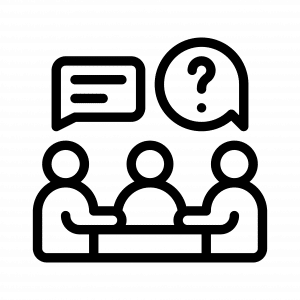Leadership Framework Design
Management Consulting Solution

Drive Leadership Framework Design with culturally aligned & AI-driven strategies, empowering, agility, and competitive advantage. This consulting solution is complemented with AMS's Respect, Empathy, Sincerity, Trust (REST)℠ Stewardship Framework, designed to enhance high-performance enterprises. A structured leadership framework establishes principles, competencies, and strategic practices for effective decision-making, collaboration, and long-term success. Organizational excellence depends on cultivating leaders who embody agility, confidence, and strategic foresight at all levels.
This model ensures continuous leadership development through assessment, feedback, coaching, and career planning, reinforcing executive presence across evolving business climates. By integrating AI-driven insights from the AMS Real-Time, Ethical, Adaptive, Learning (REAL)℠ Operating Framework, we further enhance your strategic agility by precisely aligning leadership teams with organizational objectives. AI enables dynamic data analysis, trend forecasting, and adaptive decision-making, ensuring leaders remain responsive, ethical, and impactful. This fully integrated approach optimizes leadership effectiveness, strengthens operational efficiency, and drives sustained competitive advantage.
Related Training
Related Research
Related Projects
Foundational Solution: Design & Implementation
The foundational solution outlined below is delivered as a scalable, customizable, and collaborative engagement. Please explore our PCFSM above to learn more about how we partner with you to design a tailored solution.

Essential Solution Components
Strategic Leadership Alignment
-
Defined Leadership Roles & Responsibilities – Establish clear leadership expectations to ensure accountability and strategic execution.
-
Cross-Functional Collaboration – Develop structured frameworks that enhance communication, streamline decision-making, and foster synergy across leadership tiers.
-
Vision & Organizational Alignment – Ensure leadership strategies align with business objectives, reinforcing long-term success and adaptability.
-
REST℠-Driven Leadership Culture – Embed Respect, Empathy, Sincerity, and Trust (REST℠) principles to strengthen leadership cohesion and ethical decision-making.
Leadership Development & Competency Building
-
Executive Coaching & Mentorship Programs – Equip leaders with the skills to navigate complex business challenges and drive strategic execution.
-
Competency Mapping & Skill Development – Identify leadership strengths and gaps to enhance decision-making and adaptability.
-
AI-Enhanced Leadership Insights – Utilize AI-powered analytics to assess leadership effectiveness and refine development strategies.
-
REST℠-Integrated Leadership Training – Embed ethical leadership principles to reinforce trust, collaboration, and long-term success.
Operational Efficiency & Leadership Execution
-
Process Optimization & Decision-Making Models – Implement structured frameworks to enhance efficiency, reduce redundancies, and optimize leadership workflows.
-
Performance Metrics & Benchmarking – Establish KPIs to measure leadership effectiveness, track improvements, and ensure alignment with business objectives.
-
Scalability & Future-Proofing – Design adaptable leadership models that evolve with business needs and market dynamics.
-
Continuous Improvement Methodologies – Implement structured refinement cycles to sustain excellence and responsiveness in leadership execution.
Cultural & Organizational Adaptability
-
Trust & Empathy-Driven Leadership Culture – Cultivate an environment rooted in mutual respect, understanding, and shared success.
-
Change Management & Leadership Adaptation Strategies – Develop structured frameworks to facilitate leadership transitions, ensuring minimal disruption and maximum operational efficiency.
-
Authenticity & Open Dialogue – Encourage sincerity and transparency in leadership interactions to foster meaningful connections and strategic cohesion.
-
REST℠-Embedded Leadership Culture – Ensure foundational ethical principles guide leadership interactions, reinforcing resilience and adaptability.
Sustainable Growth & Competitive Advantage
-
Strategic Adaptability & Market Responsiveness – Equip leadership teams with the agility to navigate evolving business landscapes and emerging opportunities.
-
Innovation-Driven Leadership Models – Foster a culture of continuous learning and strategic innovation to maintain competitive advantage.
-
Long-Term Leadership Sustainability – Develop frameworks that ensure enduring success and alignment with evolving business objectives.
-
REST℠-Guided Leadership Transformation Strategies – Leverage AMS’s proprietary methodologies to drive ethical, scalable, and high-impact leadership growth.
Leadership Accountability & Governance
-
Defined Decision-Making Protocols – Establish clear governance models to ensure accountability, risk management, and ethical leadership.
-
Structured Leadership Evaluation & Feedback Loops – Implement AI-driven insights and performance analytics to continuously assess leadership effectiveness.
-
REST℠-Aligned Leadership Accountability – Embed structured accountability frameworks that reinforce ethical leadership, transparency, and stakeholder trust.
-
Crisis Management & Risk Mitigation Strategies – Develop responsive leadership protocols to navigate challenges, ensuring resilience and informed decision-making.
How Your Organization Will Benefit
Leadership development strengthens organizational agility, innovation, and long‑term growth by integrating structured processes, AI‑driven insights, and continuous learning into strategic planning. A well‑designed framework aligns leadership capabilities with organizational goals, builds a strong pipeline of adaptable leaders, and enhances decision-making through data‑driven performance tracking. Functional role alignment ensures Project Managers, Operational Leaders, and Support Teams develop the competencies needed for effective collaboration and execution. By embracing structured development, organizations gain clarity, consistency, and a competitive edge, reinforcing resilience and sustaining high performance in a rapidly evolving market.
How AMS Can Help
We are uniquely positioned to support successful solution implementation through a structured, modern approach grounded in our Predictive Consulting Framework℠. By combining collaborative solution design with disciplined execution, we help clients move from concept to adoption with clarity and confidence. Our methodology ensures knowledge transfer at every stage, empowering teams to understand not just what is being implemented, but why it works and how to sustain it. This integrated approach strengthens alignment, accelerates adoption, and results in solutions that are fully embedded, operationally sound, and built to last.
Join the ranks of leading organizations that have partnered with AMS to drive innovation, improve performance, and achieve sustainable success. Let’s transform together, your journey to excellence starts here.

